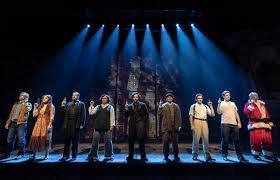#byck -> sky high
Text

whinneas gage?
#mlp#i jest but at the same time i know that puns arent the mlp naming convention#but im bad at coming up with mlp names#well i did some ok ones for the assassins like lho -> patsy#i do in fact think hes guilty but it still works#or like lynette fromme's nickname squeaky is basically a pony name already#moore-> cloudy skies#byck -> sky high#hinckley -> minor key#etc
496 notes
·
View notes
Text
Informal (and sorry, very long) review of ASSASSINS at Signature Theatre

ASSASSINS is famous for its provocative concept—telling the story of nine people who assassinated or attempted to assassinate US Presidents in a series of songs and vignettes—and it feels even more daring when staged only 15 minutes from the White House. But this musical isn’t a tasteless exercise in shock value for the sake of shock, nor is it a misguided attempt to portray assassins as ‘just misunderstood.’ These nine central figures are alternately pathetic, disturbing, funny, repulsive, charming, and eerie. Some are clearly delusional, others simply disillusioned. But together, they represent the dark side of the American Dream.
Americans are raised with a sense of exceptionalism, a belief that we deserve everything we want simply because we’re Americans. At some point, we realize that only a few people have the luck, money, skills, and connections to achieve their dreams. Most of us accept that it’s not really true that “anyone can become the President.” But some troubled people throughout the country’s history cling to a distorted corruption of this dream: anyone can kill a President.
That doesn’t mean we should agree with their horrifying choices. But it does let us examine what aspects of life in America make some people so desperate to be seen and remembered, by any means necessary. “Where’s my prize?” is the childish refrain these assassins sing over and over again as they wander through the grey purgatory they’ve been consigned to.
Historically, productions of ASSASSINS are set in a ghastly carnival where contestants are encouraged to ‘step right up’ and shoot a president! A wonderful community production at Dominion Stage created a masterpiece of vivid Americana in which an electric chair or hangman’s noose were reimagined as theme park rides. This production took the opposite route by setting the action in a grimy, industrialized, empty stage in which pieces of furniture like a bench, the steps to a gallows, or a sofa float on and off like ghosts. Through this strange empty world, assassins interact unbounded by time or space, cursed to constantly repeat their most famous actions and relive their frustrations. Garfield assassin Charles J. Guiteau instructs would-be Ford assassin Sara Jane Moore in the finer points of shooting. McKinley assassin Leon Czolgosz reprimands attempted Reagan assassin John Hinckley for carelessly breaking a bottle.
The only set piece that remains throughout the show is a weathered and ghostly replica of the Presidential box at Ford’s Theatre, plunked onto the stage as though fallen from the sky. Here, the brooding spectre of John Wilkes Booth sits and watches the show unfold—and yes, he recreates his famous jump from the box. He serves as a kind of ringleader to the assassins, weaving through crowds, advising that everyone try their hand at assassination as a cure for all of their ills—even chronic stomach pain. After all, he was the first to pull off the historic act. We even see him convincing Lee Harvey Oswald to change the course of history by bringing assassination into the age of television.
As Booth, there’s a whiff of the rock star about Vincent Kempski—fitting, because Booth was a celebrity and even heartthrob in his day even before shooting Abraham Lincoln. Most of the time, he seems at ease, in control, erudite—we might even be seduced by his words until he explodes in fits of rage and reminds us how twisted and monstrous his views really are. Kempski only occasionally unleashes the full power of his singing voice, and when he does, it feels like a punch in the gut.
One minor gripe with his performance, though not limited to Kempski’s portrayal alone: his Booth, like most I’ve seen, delivers his lines with a thick Southern drawl. Not only did that occasionally make it difficult to understand his words, I doubt the real John Wilkes Booth would have spoken with such a heavy accent. For one, although he supported the Confederacy, he was from Maryland. For another, his father was British. And most importantly, he was a professional stage actor before the era of microphones and would have been well-trained in diction. Still, his charisma was palpable throughout the show. The moment he set foot on stage, a chill ran down my spine: it really was like seeing a ghost.
Lawrence Redmond plays the disgruntled worker Leon Czolgozs with gravitas and stoic desperation. He is perhaps the most sympathetic—or pathetic—of the assassins, and he gives us a sense of the loss of human potential. As the crass Sam Byck, attempted assassin of Richard Nixon, Christopher Bloch is horribly funny, spouting commercial catchphrases and leaving professional advice to Leonard Bernstein on an audiotape recording.
Some of the most enjoyable scenes of the evening were those between the two attempted assassins of Gerald Ford, Lynette “Squeaky” Fromme (Rachel Zampelli) and Sara Jane Moore (Tracy Lynn Olivera). These are two deeply kooky women—a ditzy Manson groupie and a frumpy mom who’s been married five times and is endlessly losing items in her oversized bag. Together, they shoot at a bucket of fried chicken and bond over an unexpected shared acquaintance in Manson himself.
Zampelli may not be the childlike pixie we’d expect as Squeaky Fromme, but she totally inhabits the character of a lost soul, a flower child whose brains, if she ever had them, are long-since fried and warped. Her voice isn’t a high-pitched girlish squeak but has a distinctive creaky vocal fry to it that makes her sound utterly deranged. She’s so intense in her devotion to Manson that she ranks among the most unsettling characters on the stage. She also shares a strangely beautiful duet, “Unworthy of Your Love,” with sad sack John Hinckley (Evan Casey), a failed songwriter who’s obsessed with Jodie Foster.
As Sara Jane Moore, Olivera is absolutely hysterical in both senses of the word. A chatty, scatterbrained housewife, she seems to represent the mundane and trivial compared to Squeaky’s revolutionary furor— but she can also burst into tears or pull a gun on you at any second. Her utter lack of self-awareness and deadpan one-liners like “I couldn’t hit William Howard Taft if he was sitting on my lap” made her an audience favorite. Ms. Olivera has a special talent for making dialogue sound totally natural, as if everything she says is an ad-lib. I’ll jump at the chance to see any show she’s in because she makes every character completely her own.
But the performer who truly stole the show, and my other favorite local actor, is Bobby Smith, as the lifelong loser, Charles Guiteau. Guiteau is a comically tragic figure, a man who failed at everything he did and still retained the grandiose belief that his actions were divinely inspired. He was so consumed with his delusional belief that President Garfield would make him the Ambassador to France that he shot him. As Guiteau, Smith does a jaunty dance up and down the steps of the gallows before he is to be hanged, singing a refrain of “Look on the bright side!”
Guiteau is a man of extremes, euphoric and despondent at the drop of a hat. Smith, whose appeal as a performer often lies in his unassuming, everyman demeanor, gives amazing nuance to those abrupt transitions. We see real tears shining in his eyes beyond his too-wide smile, a tremble of the lip or shaking of the hands that betray his instability. He’s incredibly entertaining to watch every moment he’s onstage, yet you’re always simultaneously concerned for and creeped out by him. There’s something so obviously ‘not right’ with Guiteau. The last character to make me feel that way was Gollum.
Tying the whole story together is Sam Ludwig as the Balladeer, who serves as a cheery narrator for the show, delivering songs that span the gamut of American music styles. These are some of the most toe-tapping tunes in Sondheim’s catalog, contrasted sharply with the discordant numbers that run between them. Ludwig also inhabits a second role, which may come as a surprise (and isn’t listed in the program). He embodies the saccharine spirit of an American narrative that sees assassination attempts as isolated incidents rather than a symptom of a deeper illness. I occasionally found his piercing tenor voice a little grating to my ears, but it suited his character well—and I was sitting very close to the stage. An increasingly mangled rendition of ‘Hail To The Chief’ ties the musical numbers together.
This show runs almost two hours with no intermission. It’s so immersive that it gives you the curious sense of waking up from a vivid dream as you leave the theatre. You almost feel that the assassins linger behind you, reliving their crimes and failures in the abandoned theatre once you’ve gone home to bed.
Assassins plays through September 29. Don’t miss this show. You’ll find yourself laughing at the most unexpected lines and thinking about the most minor moments long after the curtain call.
#assassins#musicals#musical theatre#sondheim#dc theatre#dc metro#signature theatre#sigassassins#informal review
37 notes
·
View notes